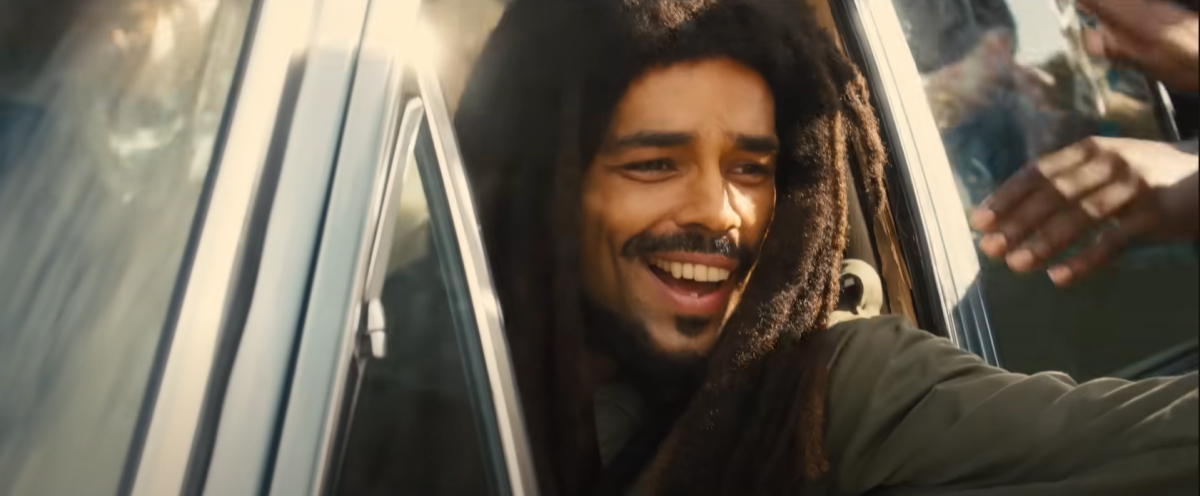Bob Marley is easily one of the most well-known and beloved figures in the history of reggae music and Jamaican history.
“Bob Marley: One Love” aims to explore the life of Marley through his rise to stardom and all that occurred in his life at the same time. As someone of Jamaican heritage, I was curious about this film and decided to watch it to learn more about Marley and his journey.
The movie opens in medias res, in 1976, with Marley at a press conference about a peace conference he is holding in a couple of days. Not long after, Marley, his wife Rita, and some members of their band, The Wailers, are shot by assassins, but all survive and go on to still hold the concert. In the face of the ongoing political strife in Jamaica, Marley has Rita take their kids to America to live with his mother while he and The Wailers go to London to work on their next album.
While in London, Marley records the album “Exodus,” which becomes a smash hit and begins a tour across Europe. While on tour, Marley gets into a fight with Rita over his responsibilities and priorities and is later diagnosed with melanoma skin cancer. With his health on the line, Marley returns to Jamaica and holds the One Love Concert, performing the titular “One Love.”
The music is easily one of the best parts of the film. Marley’s music is so pleasant and relaxing to listen to. The film makes good use of it to convey emotions experienced by the characters throughout the story and celebrates how good of an artist Marley was. Reggae is a genre I do not listen to often, but will always enjoy.
The cast did well in every scene they were in. Kingsley Ben-Adir’s portrayal of Marley is charming and engaging. It was interesting to see him play a different part from the last movie I saw him in, where he played Basketball Ken in “Barbie.” Lashana Lynch plays Marley’s wife, Rita, and gives a powerful performance in every scene she is in. The actors play off of each other and the rest of the cast in such an authentic way.
The film could have done better at communicating details in the movie. Some events are breezed through in order to get to the next scene. In addition, several characters are not given as much explanation or exploration as I would have wanted, like the other members of Marley’s band, his producer or his manager. With these people being so crucial to Marley’s career, it is odd that they do not garner as much attention.
The film had a repeated scene of a young Marley being chased by a man on horseback through a burning cornfield. While this was an interesting visual, I was confused about what it was supposed to represent. It is never explained in the movie at any time as to what it could symbolize. It possibly could be in reference to Marley’s father, as there is a brief flashback where we see him on horseback. Toward the end of the movie, young Marley gets on the horse with the man chasing him, who calls him his son, but it is unclear, and I am unsure what they were trying to communicate with this metaphor.
The film repeatedly uses flashbacks across its runtime. Some of them are meant to give more context on Marley’s relationship with Rita, Rastafarianism and music as a whole. While they are interesting to see, it makes the film jumbled by almost constantly going back and forth between past and present. The film would have been better off by having the events proceed chronologically instead of cutting back and forth.
There was also a weird use of credits at the movie’s beginning, explaining a bit of Marley’s early life. It felt awkward and more aligned with what you would expect from a documentary, not a biopic movie. There were credits at the end, explaining Marley’s eventual death and other details, but the credits at the beginning threw me off from what I had expected.
While “Bob Marley: One Love” has some unusual choices made in it, it provides a touching tribute to the man whose story it wants to tell. Love was put into the film, not just by the actors and crew, but also by Marley’s children, who worked on the film in crucial ways to ensure that their father was portrayed as the man they knew and loved.



Donna Calamaro • Feb 29, 2024 at 1:24 pm
I loved Bob Marley’s music and message. I think this is a great critique of the movie. I was curious of the imagery of the man on the horse, the boy and the fire and also was left curious of the people and event of his last days. Why he didn’t choose treatment, did he pass quickly, was it Rita that was by his side etc.
Barbara Cowan • Feb 28, 2024 at 7:44 am
I loved lived the movie. I was very sad that Jimmy Buffett wasn’t alive to see it. He would have loved it as much as I did.